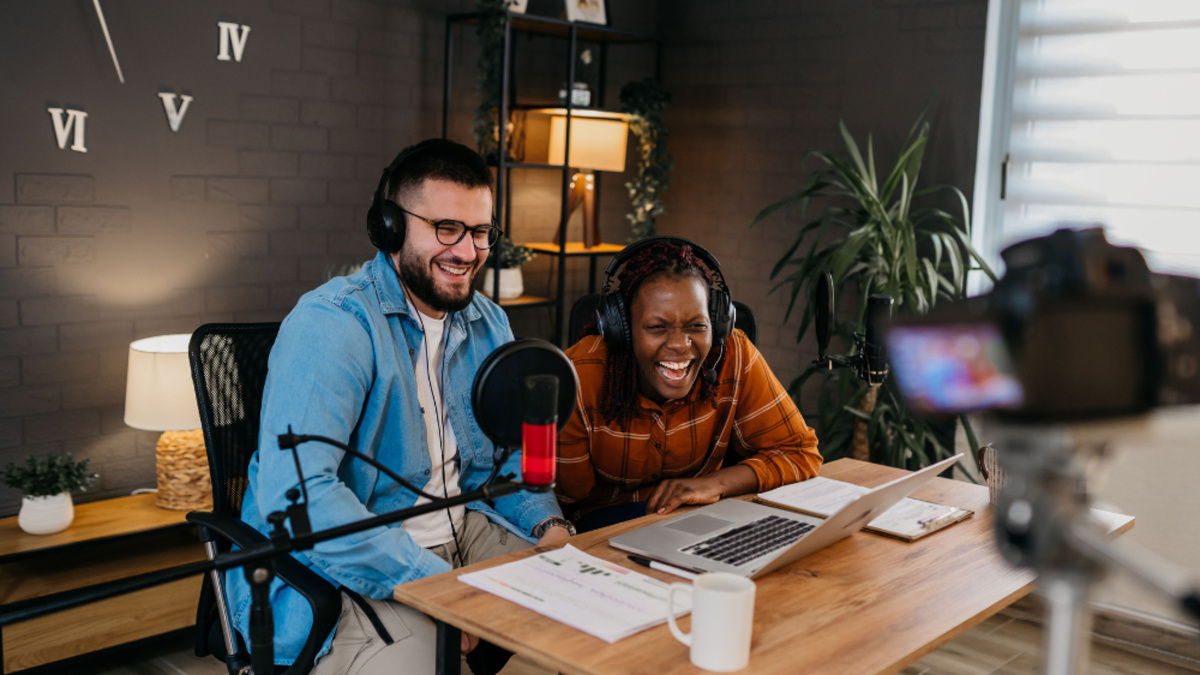Profitable Podcasting: Monetize Your Passion

Joy Wallet is advertiser-supported: we may earn compensation from the products and offers mentioned in this article. However, any expressed opinions are our own and aren't influenced by compensation. To read our full disclosure, click here.
What is podcasting?
- Access up to $750 per pay period
- No interest, mandatory fees, or credit checks
- Over 15 million downloads and counting
Characteristics of podcasts
- Audio or video content. Podcasts can be purely audio-based, video-based, or a combination of both. Most podcasts are audio-focused, featuring conversations, discussions, interviews, storytelling, or educational content. Video podcasts, often called "vodcasts" or "vidcasts," provide a visual element alongside the audio.
- Episodic. Podcasts are organized into episodes, which can vary in length and frequency. They can be as short as a few minutes or as long as several hours. Some podcasts release new episodes daily, while others do so weekly, biweekly, or less frequently.
- Subscription-based. One of the defining features of podcasts is their subscription model. Listeners can subscribe to a podcast using various podcasting apps or platforms. Subscribing ensures that new episodes are automatically downloaded or made available to the listener's device when released.
- Diverse content. Podcasts cover various topics and genres, from news and storytelling to technology, entertainment, self-help, comedy, education, and more. There's a podcast for virtually every interest or niche.
- Accessibility. Podcasts are accessible to anyone with an internet connection and a device capable of playing audio or video files. Most podcasts are free to listen to, although some may offer premium content behind a paywall.
- Independent production. Many podcasts are independently produced by individuals, small teams, or organizations. This allows diverse voices and perspectives to be heard in podcasting.
- Distribution platforms. Podcasts are typically distributed through podcast directories and apps such as Apple Podcasts, Spotify, Google Podcasts, and many others. These platforms make it easy for listeners to discover, subscribe to, and listen to their favorite podcasts.
- Monetization. Podcasters can monetize their content through various methods, including advertising, sponsorships, listener donations (via platforms like Patreon), selling merchandise, or creating premium subscription-based content.
How to make money podcasting
Advertising and sponsorships
Listener donations and crowdfunding
Merchandise sales
Affiliate marketing
Live shows and events
Consulting and services
Crowdsourcing or crowdfunding campaigns
Partnerships and collaborations
Licensing and syndication
- Access up to $750 per pay period
- No interest, mandatory fees, or credit checks
- Over 15 million downloads and counting
Pros and cons
- Creative outlet. Podcasting allows you to express yourself, share your knowledge, and pursue your passion while potentially earning money.
- Flexible schedule. You can create content on your own schedule, allowing you to balance podcasting with other commitments.
- Low barrier to entry. Compared to other forms of media production, podcasting requires relatively affordable equipment and software, making it accessible to many.
- Global reach: Podcasts can reach a global audience, enabling you to connect with listeners worldwide.
- Monetization opportunities. Podcasting offers various income-generating ways, including advertising, sponsorships, merchandise sales, and crowdfunding.
- Build authority. Successful podcasting can establish you as an expert or thought leader in your niche.
- Community engagement. Podcasts often foster community among listeners, creating a loyal audience.
- Competitive landscape. The podcasting space is highly competitive, making it challenging to stand out and attract a substantial audience.
- Time-consuming. Producing high-quality content, promoting your podcast, and managing monetization can be time-intensive.
- Initial investment. While podcasting can be cost-effective, there are still expenses related to equipment, hosting, and marketing.
- Inconsistent income. Podcast revenue can be inconsistent, especially when starting. It may take time to build a reliable income stream.
- Content quality pressure.: To retain and grow your audience, you must consistently produce engaging and high-quality content, which can be demanding.
- Listener growth. Attracting and retaining listeners can be slow, and there's no guarantee of success.
- Market saturation. Some niches are oversaturated, making it harder to carve out a niche and monetize effectively.
- Dependency on algorithms. Success on some podcast platforms can depend on algorithms that are beyond your control.
FAQs
The bottom line
Joy Wallet is an independent publisher and comparison service, not an investment advisor, financial advisor, loan broker, insurance producer, or insurance broker. Its articles, interactive tools and other content are provided to you for free, as self-help tools and for informational purposes only. They are not intended to provide investment advice. Joy Wallet does not and cannot guarantee the accuracy or applicability of any information in regard to your individual circumstances. We encourage you to seek personalized advice from qualified professionals regarding specific investment issues. Featured estimates are based on past market performance, and past performance is not a guarantee of future performance.
Our site doesn’t feature every company or financial product available on the market. We are compensated by our partners, which may influence which products we review and write about (and where those products appear on our site), but it in no way affects our recommendations or advice. Our editorials are grounded on independent research. Our partners cannot pay us to guarantee favorable reviews of their products or services.
We value your privacy. We work with trusted partners to provide relevant advertising based on information about your use of Joy Wallet’s and third-party websites and applications. This includes, but is not limited to, sharing information about your web browsing activities with Meta (Facebook) and Google. All of the web browsing information that is shared is anonymized. To learn more, click on our Privacy Policy link.
Images appearing across JoyWallet are courtesy of shutterstock.com.








